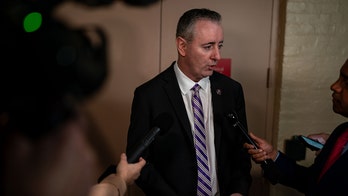MONTGOMERY, Ala. -- Self-described outsider Robert Bentley won Alabama's Republican nomination for governor Tuesday night over establishment candidate Bradley Byrne with a strong showing in rural areas.
In the unofficial count, Bentley had 56 percent of the vote to Byrne's 44 percent with 83 percent of the precincts reporting.
Bryne ran strong in the state's four big counties, but Bentley outperformed Byrne in small counties, including areas where Tim James and Roy Moore did well when they ran third and fourth in the June 1 Republican primary.
Bentley, a retired Tuscaloosa physician, was considered a little-known state legislator in a field of seven hopefuls until he made a surprise second-place finish in the primary last month.
The largely self-funded candidate said voters began to notice him when he pledged to serve without pay until Alabama's near-record unemployment rate drops to normal levels. Then the reassuring bedside manner of a 67-year-old doctor took over as Bentley talked about creating jobs.
"The key to the success of this is our ability to communicate," Bentley, 67, said.
Byrne called Bentley to congratulate him and said he would vote for Bentley in the general election Nov. 2, when he faces the Democratic nominee, Agriculture Commissioner Ron Sparks.
Byrne, the state's former two-year college chancellor, ran with the support of top Republican officeholders, including Gov. Bob Riley, and with strong financial support from business groups.
Bentley portrayed Byrne as the choice of establishment Republicans who want to maintain the status quo in Montgomery.
Riley, a two-term governor prohibited by term limits from running again, pushed Byrne to leave the state Senate in 2007 to become Alabama's two-year college chancellor, where he restored credibility after a corruption scandal that brought down a former chancellor and three legislators.
"I know what I asked him to do with the community college system and I know how well he performed, so I have a great deal of confidence in Bradley," Riley said. He said he had never worked with Bentley on any issues in the Legislature.
William Stewart, retired chairman of the political science department at the University of Alabama, said voters viewed Byrne as the choice of the Republican elite, and that hurt Byrne in a year when voters are in an anti-incumbent mood.
"Bentley was perceived as the candidate of the average man and woman," Stewart said.
Byrne, a 55-year-old lawyer, focused much of his campaign on limiting the influence of the state teacher organization, the Alabama Education Association, and described Bentley as a would-be Democrat who was a sure vote for the Democrat-led AEA in the Legislature.
Byrne and Riley criticized AEA for trying to turn out votes for Bentley, particularly among people who had participated in the Democratic primary June 1. Bentley said he welcome every vote.
Election officials said they saw little evidence of Democratic crossover votes in the light turnout Tuesday.
"That's the kind of thing that has to be organized locally if it is going to happen, and to my knowledge, there was no organizing locally," Escambia County Probate Judge Emily Mims said.
AEA Executive Secretary Paul Hubbert was pleased Tuesday night to have candidates favored by his organization as both the Republican and Democratic nominees for governor.
"I believe either of the nominees will do a good job for Alabama," he said.
Retired state employee Viola Ludden of Montgomery said she was worried about Bentley having voted with AEA, but she ended up picking him because he made the best impression on her.
"I just feel he's honest," she said.
Another Montgomery retiree, Pat Sullivan, said she voted for Byrne because of his impressive record in state government and because he would be a good spokesman for the state.
"He looks like a governor and acts like a governor," said Sullivan, who worked in a doctor's office.
Byrne, considered the front-runner through much of the campaign, reported raising nearly $7 million with generous support from the same business groups that helped elect Riley.
Bentley got few contributions outside the medical profession and ran his campaign largely off $1.9 million in personal loans.
"We used our retirement money, life insurance money and loans on our house. We are in considerable debt," he said.




